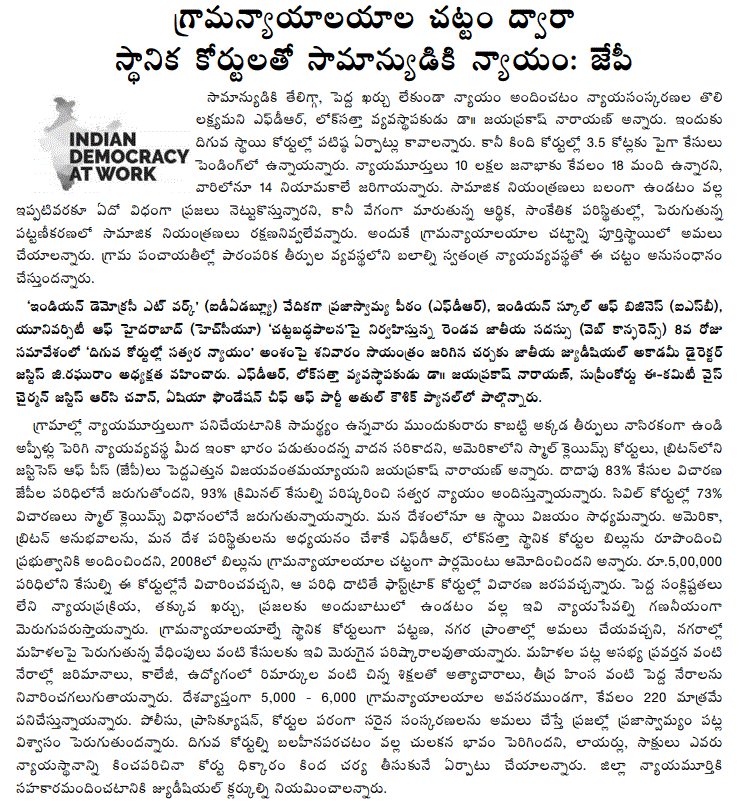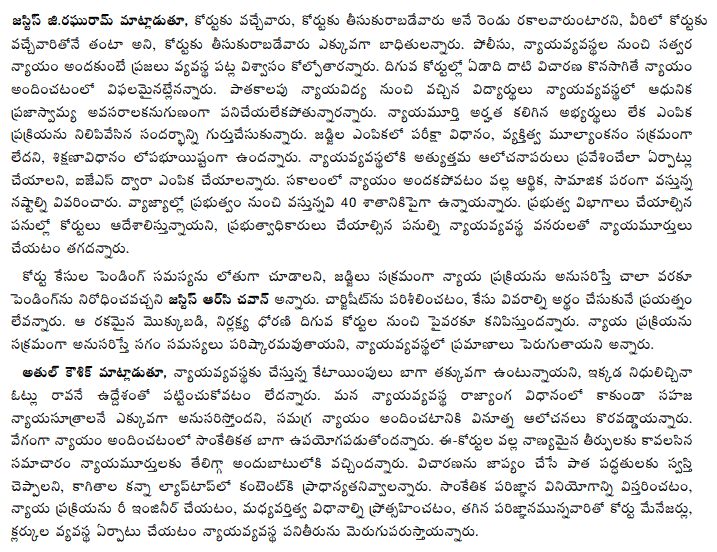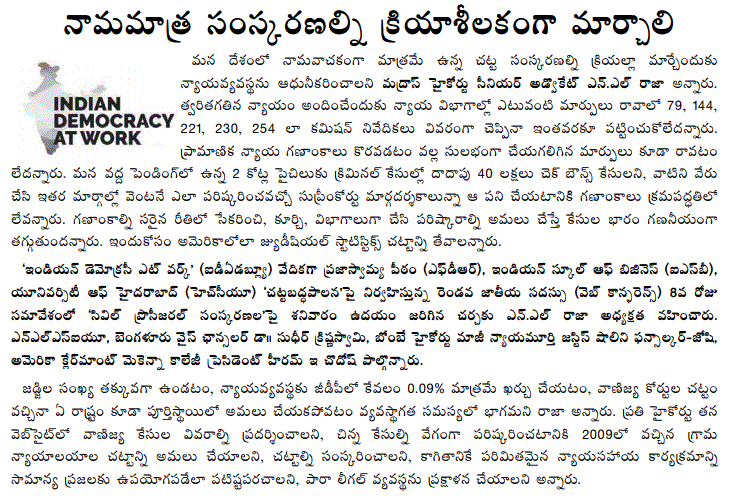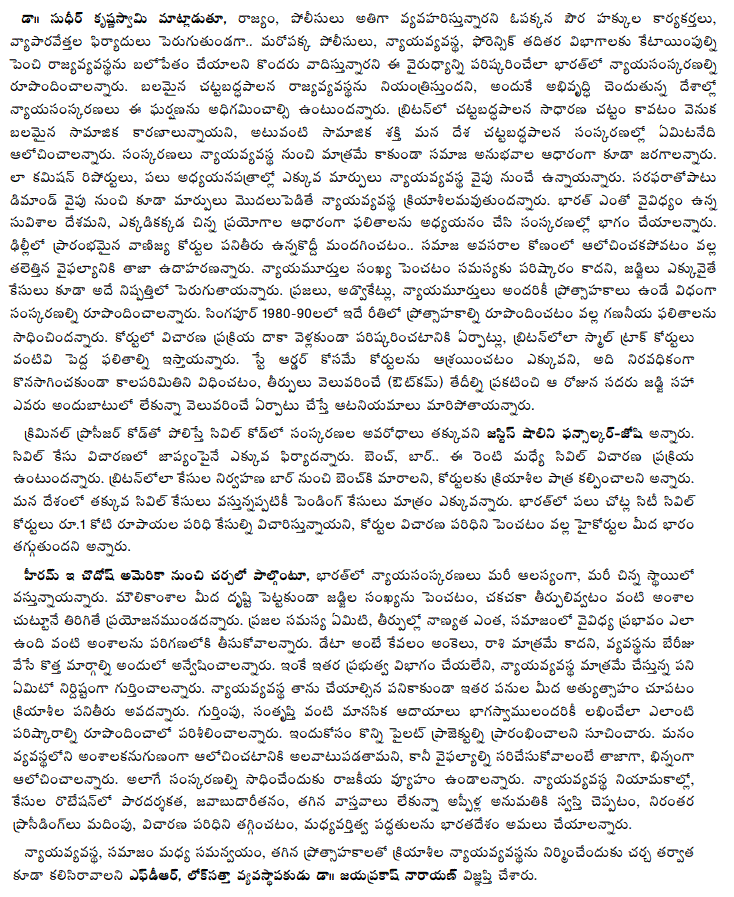IDAW SESSION on STRENGTHENING CONSTITUTIONAL COURTS
The Seventh session of the Indian Democracy at Work Conference 2021 on Rule of Law saw a distinguished panel deliberate on ways to Strengthening Constitutional Courts. Justice Madan B. Lokur, Former Judge, Supreme Court of India chaired this session. The other panelists were Shri V. Sudhish Pai, Lawyer and Jurist, Shri Alok Prasanna Kumar, Co-Founder and Lead, Vidhi Centre for Legal Policy, Karnataka, Ms. Cathy Catterson, Former Clerk of Court of Appeals, Ninth Circuit, USA and Dr. Jayaprakash Narayan, Retd. IAS and the founder of Foundation for Democratic Reforms also participated.
Justice Madan B. Lokur opened his remarks by stating that Supreme Court should be in the nature of the federal court with its limits and restraints. It should not intervene in High Courts decisions and let High Court of a state decide on matters of its state law. The necessary interventions should be cautiously and judiciously done. The Supreme Court should also take up issues which have all India impact and not just impacting individual state issues. For this it is necessary to use filters given in constitution. He added that it is also necessary to have time bound High Court decisions and they should have the final word in interpretation of the law in the state. He added that more emphasis should be given to imparting constitutional vision to lower courts so that most of the workload coming to constitutional courts can be reduced. He also suggested the ideas of increasing the number of benches in high courts in different areas of the state must be evaluated with caution. In addition, he gave an example of case management in USA that brought down the case load by 90% in three years such case management strategies must be applied to our courts also. Strong effort has to be made to achieve reforms working with in the system and using the resources of the system.
Mr, Sudhish Pai stated at the outset that the primary role is to uphold the constitutional values and not mere dispute resolution. Supreme Court should work mostly with definition of fine nuances of constitutional charter and this is where the intellect and integrity of the judges comes into play. However, it looks like Supreme Court has turned into final court of appeals and it appears that the Court does not have time for serious constitutional issues. He wondered as to what is the appropriate number of Judges in the SC and increasing the number might be good. He also added that increasing the number of judges in constitutional courts indiscriminately will dilute their role and prestige. He mentioned that the constitutional courts cannot just be a court of error correction from its lower courts. He was confident that once we strengthen high courts, workload in SC will decrease. A quality that is most important is that statesmanship, legal balance, scholarship and integrity of judges in SC will go a long way in reforming the system.
Mr. Alok Prasanna Kumar stated at the outset that all courts are and must be essentially constitutional courts not just the High Court and Supreme Court. He stated some glaring problems in the High Courts and should be immediately addressed. Bureaucratic stubbornness in not implementing the High Court orders is very common. He also said that High Courts are too concentrated in big cities in the state and so most of the cases are from urban areas. He suggested that they should have more benches of high courts in different areas of the state. Criminal cases appeals are also not disposed off quickly sending wrong signals in the society and a special bench must be quickly constituted to quickly dispose the back logs. In addition, excessive number of bail petitions are taken up in the High Courts as lower courts simply deny bails, this must be urgently looked into. Another important concern is that there is a bias towards appointment of judges from bar and not from subordinate judiciary and this needs to change so that there is about fifty percent selected from lower benches. This adds experience to the depth of the benches in the High Court. In the short term, the High Court should prioritize and dispose of cases of 10 years or more pendency with clear deadlines. In the long term, Mr. Alok Prasanna suggested that software and artificial intelligence should be used to manage the voluminous material that needs to be reviewed in the courts. He finally added that the Supreme Court is apex civil, criminal and constitutional court and it may serve us well to be divides it into three such specialized courts.
Ms. Cathy Catterson stated that workload and case management, in addition to important reforms is critical. She pointed that Judges should be appointed for longer terms as they can provide lot of institutional knowledge. She pointed out that it is critical to have management and staff work with administrative matters and save time of judges so that they can concentrate on adjudication. She suggested that the courts can have staff lawyers that can look into jurisdictions and also have a preliminary review of the cases. These staff attorneys are centralized and work under the Chief Justice with supervisory guidance. Role of mediation in civil cases can also be considered to reduce the workload in the courts. To eliminate the delay, the contesting parties should be given strict deadlines to file all their information, counters, and evidence. She suggested a court management system where in simple cases can be disposed off with briefs and allot less time of judge and the complex cases more time. Ms. Catterson emphasized on the role of court staff which is professional with appropriate training and taking the services of paralegal staff.




